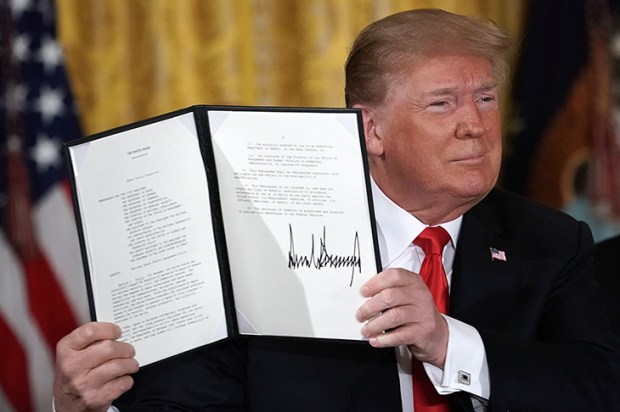Peter Jay (1937-2024), a UK economist, broadcaster and ambassador to the US between 1977 and 1979, was ‘in the room’ when renowned US economist Art Okun (1928-80) sought to solve a political problem for President Lyndon Johnson.
It was 1967, the year before Okun became the White House’s chief economist and the problem was this. Johnson intended to seek re-election but the economy was likely headed into recession.
Jay told the UK’s Telegraph in 2008 that Okun had the brainwave that if there was a definition of recession it would be easier to deny the US was in recession.
‘On the back of an envelope, he invented the idea that in order to call it a recession you had to have had two consecutive quarters of negative growth,’ Jay said. ‘This was completely arbitrary – there was absolutely nothing scientific or in the economic theory that requires that a recession be defined in that way. It’s entirely spin.’
And didn’t Okun’s spin catch on – even if it only entered the mainstream after an article in 1974 by US economist Julius Shiskin (1912-1978), which, as it didn’t mention Okun, means many credit Shiskin (and others) for inventing the concept known as a ‘technical recession’.
The definition, while used elsewhere, mostly by the media, is economic gospel in Australia where it appears in textbooks and is taught in universities.
The problem, however, is the technical definition is nonsense, if a recession is understood to be weak or negative real economic growth that spells hardship for households due to a loss of income, usually via higher unemployment. The overarching weakness of the technical definition is it fails to consider the scale and context around GDP results.
Economic growth can be weak but positive, thus not in technical recession, and still lead to falling living standards. This is what Australia has experienced over the past two years.
A second problem is the technical definition rules out recessions shorter than six months. A third flaw is the components of GDP – consumer spending, business investment, government spending, net exports and the change in inventories – are subject to revision. Slight positive and negative results can be revised to the opposite.
A fourth weakness is the rigid definition gives rise to mathematical quirks that make it easier for an economy to evade a technical recession or emerge from one. A large slump in one quarter, for instance, makes a positive result more likely in the next quarter.
Take what happened in 1974. GDP (seasonally adjusted) only shrank in one quarter of that year, but by two per cent in the three months to March. This plunge, which was preceded by a result of 0.0 per cent in the December quarter, was followed by growth of 1.2 per cent in the June quarter. Everyone then considered the economy in recession, even though unemployment never exceeded 4 per cent. The slump is still rated as one of Australia’s worst. Yet there was no technical recession.
A fifth weakness – let’s again salute Okun’s shrewdness – is it’s easy to game the technical definition as Kevin Rudd’s government did in 2008, and Scott Morrison’s administration attempted during the pandemic.
Australia needs a better way of calling recessions. The solution is to follow how much of the rest of the advanced world dates business cycles.
In the US, the National Bureau of Economic Research (NBER), a private non-profit research organisation, declares recessions by evaluating an array of indicators to judge whether the US economy has suffered a significant and widespread decline in activity that lasts more than a few months.
Similar non-partisan bodies fulfil the same role elsewhere. The Euro Area Business Cycle Network evaluates that economy. In Japan, an arm of the Cabinet Office does likewise. And so on.
When gauging business cycles, the US’s NBER looks at data on personal income, employment, consumer spending, retail sales and industrial production to assess whether the criteria of depth, diffusion and duration are met. There is no fixed rule about what measures are more important. In recent decades, the indicators given the most weight have been personal income and employment.
The last US recession called by the NBER was of two months from February to April 2020. Note how the NBER dates recessions by months even though US GDP is reported quarterly.
Australia’s loss at relying on the technical definition of a recession was apparent over the past two years and highlighted again when National Accounts were released on 5 March. The report showed (seasonally adjusted) GDP per capita – a proxy for living standards – rose 0.1 per cent in the December quarter, after falling for a record seven consecutive quarters (and eight of the previous nine), where once again the greater an accumulative decline the more likely is a rebound.
The National Accounts showed GDP rose 0.6 per cent in the December quarter, nearly half 2024’s gain of 1.3 per cent. The only reason aggregate output expanded over 2023 and 2024, when GDP per capita was falling, was high immigration.
It’s likely an Australian NBER might have declared that a recession in Australia began up to two years ago. It’s arguable any NBER-clone would still think this country is in a slump – inflation-adjusted GDP per capita in the December quarter (seasonally adjusted) was still 3.1 per cent lower than two years earlier. But that’s why no government wants a body like that. The Okun deception suits.
The media, to be sure, will stay focussed on the technical definition even if an Australian NBER was created, as happens even where there is an NBER equivalent. But the view of the official recession-caller usually prevails. Any such body in Australia would likely come under political pressure if it was poised to declare a recession. Many might challenge its decisions. But not with the nonsense about two quarters of negative growth.
It’s possible too that any Australian NBER would not assert a recession occurred here of late because unemployment has stayed low. But the jobless rate was as low in 1974 and no one disputes a recession occurred then. These are the complexities economists would evaluate when making their call.
At least with an NBER lookalike, there would be a better debate about the state of the economy and thus the remedies to apply. Spinning away bad times by using a definition designed to deny recessions is absurd.
But what a gift Okun left for Anthony Albanese’s government.
Got something to add? Join the discussion and comment below.
You might disagree with half of it, but you’ll enjoy reading all of it. Try your first month for free, then just $2 a week for the remainder of your first year.













